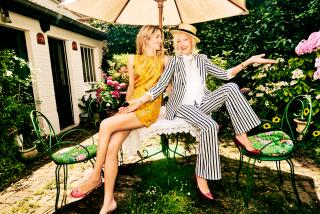Nazi Offer Spurned, Star Rises
It was the turning point in Elfi von Dassanowsky’s life.
Only 20, the young Austrian woman had already distinguished herself as a pianist and singer of the highest order. She was also a great beauty, beautiful and talented enough to have come to the attention of Hitler’s screen-obsessed Propaganda Minister Joseph Goebbels.
And so the letter went out in 1944, inviting her (commanding her) to come to Berlin to talk about becoming a star at Germany’s, now the Third Reich’s, famous UFA film studio.
Then, Von Dassanowsky recalls, reminiscing earlier this week in her Studio City apartment, she got lucky.
“I was very, very happy I didn’t speak to Goebbels. He was somewhere else that day.”
As Goebbels’ adjutant explained to her, the project the Nazi filmmakers had in mind was a musical, “The Waltz King,” and they wanted her--a genuine Viennese with a wonderful, trained soprano--to play the female lead.
An anti-Nazi, Von Dassanowsky couldn’t believe what she heard. Put up at a first-class hotel, she had seen what remained of Berlin, under siege by the Allies, as she traveled to the studio.
“My heart was breaking,” she recalls. “I saw all those bombed-out streets and houses and dead people.”
Were these people crazy? she wondered.
“Inside my head I said, ‘Don’t they know the war is over?’ ”
The young woman--a Catholic from a titled family--knew she could never work for this regime, but she also knew the consequences of saying no. Instead she said yes, but told Goebbels’ aide she wanted to return to Vienna until filming began in a month.
“If I had been to see Goebbels, he would have kept me there.”
She went home, and with the help of her mother, Baroness Von Dassanowsky, she stalled, claiming to be sick.
“How can I sing with pneumonia?” she asked the filmmakers from hell.
“I was really a good actress,” she recalls with a laugh.
The Reich fell before it could get “The Waltz King” into production, and Von Dassanowsky went on to a distinguished career as an opera singer, making her debut in 1946 as Susanna in Mozart’s “Marriage of Figaro.”
That same year, she made film history. With silent-film director Emmerich Hanus, she co-founded a film studio--Belvedere Film Vienna--and produced, directed and, in some cases, starred in her own films.
Today, as she approaches her 75th birthday Tuesday, her apartment is filled with honors for her pioneering work as a woman filmmaker and other cultural contributions. A treasured note from Elizabeth Taylor acknowledges Von Dassanowsky’s “truly fabulous career! You are indeed an inspiration.”
Belvedere’s movies, she recalls, were made under the most austere post-war conditions. For a time, the studio’s windows had no glass, and she often filmed at night because that was when Vienna was most likely to have electricity. She routinely brought props from home. But, with the ghastly war finally over, it was also a time when the most talented survivors in Europe were eager for work.
“I had a chance to get the biggest European stars,” she recalls. Among her discoveries: a very young Oskar Werner. She convinced him that he could act on screen as well as he did on the stage.
Belvedere tried to reinvent German-language film in its five-year history, making movies for a culture that had lost its innocence. The studio made edgy musicals, comedies and so-called country comedies--films, immensely popular at the time, set on farms in an idealized European countryside (Von Dassanowsky donned a dirndl when she appeared in those).
All but two of the seven films Belvedere made have been lost. Von Dassanowsky suspects they may still exist in some Soviet film archive (many of the cultural treasures of Vienna were confiscated by the Soviets, she points out).
With her son, Robert, a film scholar in Colorado, she is trying to find the missing films in hopes of reissuing them on video, with English subtitles. (The two movies in hand will be re-released later this year.)
Mother and son also plan to resurrect Belvedere and make films once more. And Von Dassanowsky has nearly completed an autobiography. When asked if she thinks her beauty helped her become one of the world’s first women studio heads, she immediately answers yes, beauty helps.
“It does for every woman. In every country.”
However useful, it does not confer virtue.
Von Dassanowsky points to Leni Riefenstahl, the beautiful, brilliant German filmmaker whose movies served the Third Reich.
Von Dassanowsky acknowledges Riefenstahl’s extraordinary talent, but says: “Sorry. She was there where she shouldn’t have been.”
As a vital part of the Austrian cultural scene, Von Dassanowsky knew many of the Austrians who had careers in post-war Hollywood (she had been actor Curt Jurgens’ piano teacher when she was still a student).
She moved to Los Angeles in the 1960s, hoping to continue to produce and direct movies. Reasoning that a person who could run a studio at 22 could make movies in Hollywood, she approached director Otto Preminger.
“I would like to go into production here,” she told Preminger, also an Austrian emigre.
His jaw dropped.
There were no women at the top in the Industry in 1962, she recalls.
Preminger told her she could be a starlet if she wanted to, but a job as a studio executive was out of the question. She chose to be a vocal coach instead.
“Today what would he say?” Von Dassanowsky wonders--regret, flickering for only an instant, on her still beautiful face.
More to Read
Only good movies
Get the Indie Focus newsletter, Mark Olsen's weekly guide to the world of cinema.
You may occasionally receive promotional content from the Los Angeles Times.










